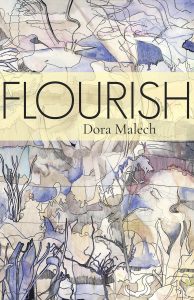by DEBORAH BACHARACH

Dora Malech, Flourish (Carnegie Mellon University Press, 2020), pp. 91
Dora Malech’s fourth collection, Flourish, uncannily mixes dark themes with playful language. The darkness can be found on the road the speaker travels en route to a wedding in Duluth, or at home on the phone at the table, or in the party pinata which is “violence and darkness, / the beast / that harbors something sweet” (“Party Games”). These poems take us to the darkness under the surface, to attempts that fail.
In the world this book inhabits, darkness is everywhere. “America: That Feeling When” begins “full of suicide Coke.” Coke is not an object of benign pleasure or sacrament, but is an instrument of self-destruction. It is depicted as dangerous, putting pressure on the speaker’s bladder so that she is forced to squat on “the back road beyond a town / where flags wave two / different flavors of anger.” Though Malech does not state the anger those flags represent (Confederate and Nazi come to mind), their presence is surely a darkness waving over this scene. And in this moment of vulnerability, the speaker suddenly notices “a spent shell casing.” It’s like a shadow creeping up behind her, the darkness of a bullet having touched this spot before, how it might again. All of these moments point to but don’t name the danger, making it more ominous.
“Late Lullaby” starts with a mother protecting a young child, answering all of the child’s questions about the world; but then the poem turns from second person to direct address of the adult child:
Ask me anything now and I’ll answer. Come home.
I call to you from the place between wars
where men are back from their battles and little
girls have not yet been sent to their own.
The mother’s desperate concern is clear: she would do anything to bring her child back to safety. But the danger is not clear. What is she trying to protect the child from? We are in this strange liminal place—“the place between wars”—and the danger is coming back no matter what the mother does. The next poem “Thousands are gathered outside the interior ministry. . .” begins: “Bloody lullabies soothe the centuries.” So, the lullaby of the previous poem links it to this one, as does the difficulty of trying to soothe in a time of violence.
The speakers in these worlds of darkness keep trying to find the light and failing. In the poem “The Aquarium” the speaker says, “I find myself now blessed / with tentacles and toxins.” She has imagined herself into a new way of being. For a moment she is transformed but then is quickly reprimanded for reaching into the tank. In the poem “Each year,” the speaker tells us, “I snap the twig to try to trap / the springing and I relearn the same lesson. / You cannot make a keepsake of this season.” The very act of trying to preserve spring kills it. The attempt will always fail.

Death, danger, a poem about spring which is a poem about the failure to learn your limits. The themes throughout the collection are dark, but the sounds are not. Malech is playful with sound. She uses alliteration, rhyme, assonance, and consonance as a commentary on the very nature of language, for speed and fun, and to create magic.
Malech’s attention-grabbing sounds often break the spell reading can place on me. As the mother in “Late Lullaby” is in the strange liminal space between wars, the sounds of these poems ask the reader to enter the liminal space between reading and comprehension. When I read a line like “parlor’s pallid parlance” (“Caldo”), I can’t just let the image of polite conversation wash over me; the tight alliteration and assonance draw my attention to the line as a crafted entity. Such intense sound defies mere meaning and demands the reader consider the nature of language itself. Malech addresses language’s ability to communicate (or not) in the series of poems that starts with “Dear Reader—” where she says:
I pulled my whole self alone under the covers
and willed it to heal. By it I mean insert
unclear antecedent here, by here
I mean there, by there I mean above but
also of course inside
So at this point it is a poem about language’s inability to clearly communicate, but the poem continues on to discuss the secret language lovers share, the way language transcends the words on the page.
In “Peter Piper Speaks and Spells,” which references a dark myth about all the town’s children because lured away, Malech clearly has fun with language by taking on the children’s tongue twister with her own twist:
Still, seek
it between back-of-the-myth of bitter
and tip-of-the-myth of sweet, splash, pinch, bit
to taste (blood), last laugh lathed lath (roof of the mouth)
erase a wraith (ghost of palate pathed) mythed me
mythed me, now you—you know.
Like Hopkins’ sprung rhythm, she festoons the line with accent—“sweet, splash, pinch, bit”— placing one accented word after the other like popping balloons. And then a few lines later she pops those balloons again—“last laugh lathed lath”– this time adding alliteration and assonance. The language is playful, as befits a poem about a children’s game. We’ve left the land of normal speech. The language has brought us into the land of myth and magic.
For Malech, language is a place of accidents and magic. She is curious what happens to the reader under the powerful spell of sounds and syllables. In “Caldo” she waves her wand and “mela miele mille” an apple can turn into honey before our eyes. She shows us how language play—in this case a few vowel swerves—can transform one object into another. By juxtaposing the magic of language against dark themes she offers a way to flourish. As she says in the title poem, “Flourish,” which is also the last poem in the book:
corkscrewing up to pour more sunlight,
celebrate
the act
we make of the temporary fact of us.
These are carefully crafted poems that take us into the dark places we need to face.
Deborah Bacharach is the author of Shake and Tremor (Grayson Books, 2021) and After I Stop Lying (Cherry Grove Collections, 2015). She has been published in Vallum, Poet Lore, and The Southampton Review among many other journals. She is an editor, teacher, and tutor in Seattle. Find out more about her at DeborahBacharach.com.

